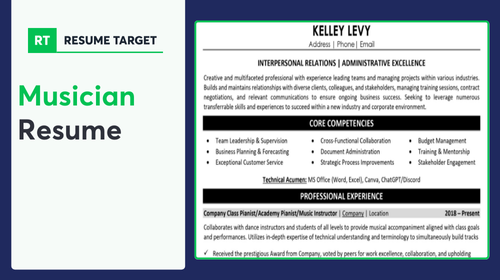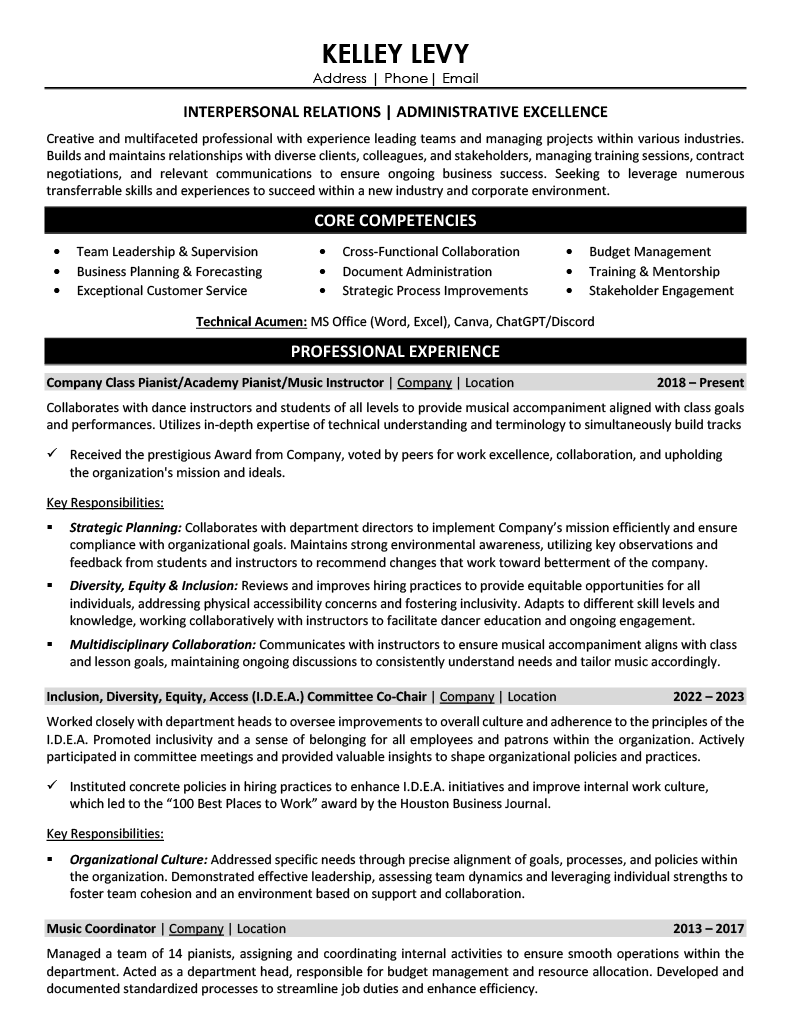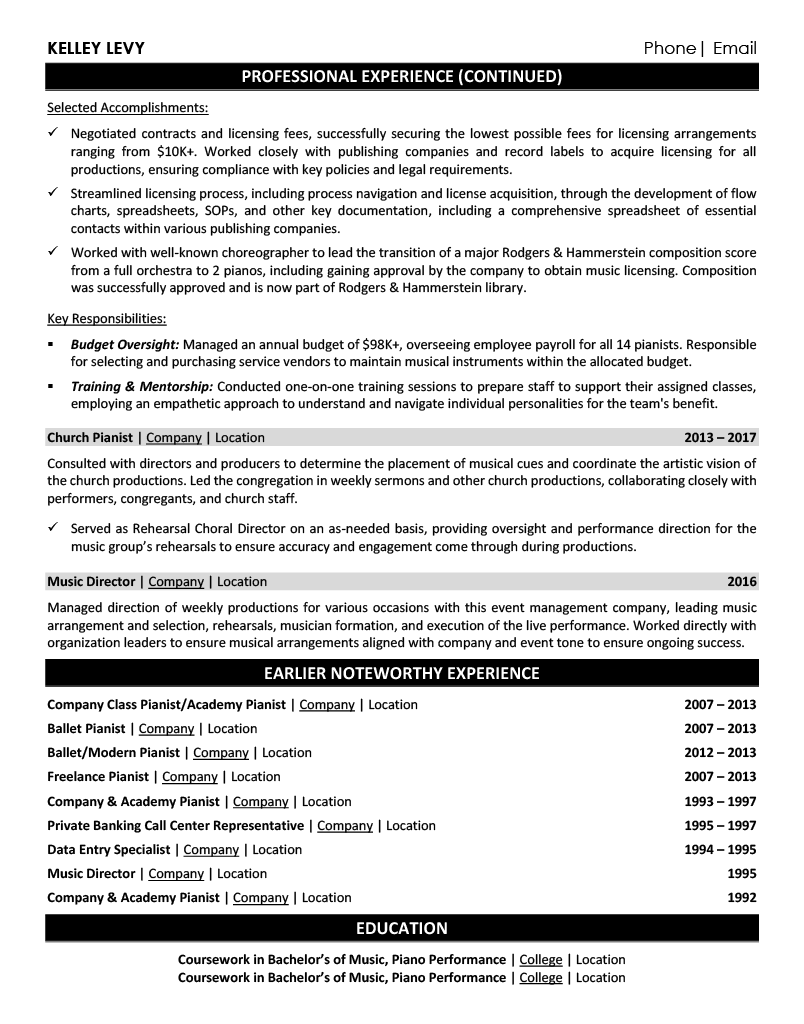

Sheet music may be your language, but writing a compelling resume often hits all the wrong notes. Many musicians struggle to translate their artistic talents into business-friendly terms that hiring managers understand.
Are you tired of seeing less qualified musicians land the gigs you want? Your resume needs to compose the perfect harmony between your creative abilities and professional achievements. The right presentation can transform your experience from background noise into a showstopping performance.
At Resume Target, we help musicians orchestrate resumes that resonate with hiring managers. We know how to translate your performances, teaching experience, and technical skills into powerful statements that get you noticed and booked.


From stirring emotions in packed concert halls to creating unforgettable recordings in studios, musicians are the masterminds behind the soundtrack of our lives, transforming abstract musical concepts into powerful emotional experiences that resonate with audiences worldwide.
As a musician, you'll spend countless hours perfecting your craft through dedicated practice, collaborating with other artists, and adapting your performances to different venues and audiences - whether you're playing in an intimate jazz club, a grand symphony hall, or a state-of-the-art recording studio.
If you're ready to turn your passion for music into a professional career, you'll find that the journey offers diverse paths - from performing with orchestras to touring with bands, teaching private lessons, or even creating music for films and video games - each requiring its own unique blend of talent, dedication, and business savvy.
Let's talk about what's exciting in the music industry! Your earning potential as a musician can vary significantly based on your specialty, venue type, and experience level. Here's what's interesting - religious organizations tend to offer higher rates than educational settings, giving you flexible options for building your career.
Figures from: U.S. Bureau of Labor Statistics
Musicians can progress from performers to producers, managers, or industry executives. Your path depends on talent, networking, and adapting to industry trends while building a strong professional portfolio.
Beyond basic musical ability, you'll need a diverse skill set to stand out in today's competitive music industry.
- Advanced music theory and composition - Digital audio workstation (DAW) proficiency - Sound engineering and production - Business networking and relationship managementBreaking into the music industry starts with mastering your craft through formal education or self-study, while building a portfolio of performances and recordings to showcase your unique musical talents.
To build a successful career as a musician, you'll need to develop essential skills like music theory, harmony, melody, and rhythm, while continuously honing your performance abilities through practice and real-world experience.
Requirements from National Association of Schools of Music
From bustling coastal hubs to vibrant music scenes inland, musicians find work across diverse venues and organizations.
Figures from U.S. Bureau of Labor Statistics
Struggling to compose the perfect resume that hits all the right notes and showcases your musical talents in a professional way? This comprehensive, section-by-section guide will help you create a well-orchestrated resume that resonates with potential employers.
As a musician, you're brilliant at composing melodies and creating harmonies, but condensing your artistic journey into a few powerful sentences can feel like trying to fit a symphony into a ringtone.
While you excel at connecting with audiences through your music, translating your diverse performance experience, technical skills, and creative achievements into a compelling written summary requires a different kind of composition - one that will make hiring managers and talent scouts want to learn more about your unique musical story.
How would you describe your musical identity and artistic approach in a way that sets you apart from other musicians in your genre or instrument specialty?
Reason: Your unique musical perspective and artistic philosophy help establish your personal brand and demonstrate what makes you distinctive in a competitive field. This helps hiring managers or potential collaborators understand your artistic value proposition immediately.
What combination of musical styles, instruments, and performance environments best represents your versatility as a professional musician?
Reason: Highlighting your range and adaptability shows potential employers or clients that you can handle diverse musical situations and requirements, making you a more valuable addition to their projects or organization.
How would you characterize your professional musical experience in terms of both technical proficiency and collaborative abilities?
Reason: Balancing technical musical skills with interpersonal capabilities is crucial in the music industry, as most opportunities require both strong musicianship and the ability to work well with others in various settings.
As a musician, you need to showcase both your technical musical abilities and your professional competencies, from instrument proficiency to performance experience and music technology skills.
Your resume should balance creative talents (like sight-reading, improvisation, or vocal range) with practical skills (such as sound engineering, music theory knowledge, or digital audio workstation expertise).
Showcase your musical journey by organizing your experience into three powerful sections: your performance roles and venues, measurable achievements (like audience growth and recordings), and core musical responsibilities that highlight your versatility as an artist.
Many talented musicians struggle to translate their diverse performances and creative work into compelling professional achievements that resonate with industry gatekeepers. Transform your musical journey into quantifiable success stories by connecting your performances, recordings, and collaborations to measurable audience growth, revenue generation, and artistic impact.
A well-crafted responsibilities section demonstrates your professional musical abilities beyond just playing instruments or singing. It shows hiring managers how your musical talents and technical skills contribute to audience engagement, revenue generation, and overall entertainment value.
Your formal music education and professional certifications demonstrate your technical proficiency and theoretical knowledge to potential clients and employers. Focus on listing your most prestigious music degrees, performance certifications, and specialized training programs that directly relate to your musical expertise, placing the most recent achievements first.
Now that you've created a strong foundation using Resume Target's comprehensive resume writing guidelines, you're ready to transform your musician resume into a powerful tool for landing your dream gig.
While many musicians focus solely on customizing their demo reels and cover letters, tailoring your resume for each specific musical opportunity - whether it's an orchestra position, teaching role, or studio work - is equally crucial for standing out in this competitive industry.
A customized musician resume not only helps you navigate through automated application systems by incorporating relevant keywords, but it also demonstrates to hiring managers and artistic directors that your specific skills and experiences perfectly align with their musical needs and ensemble culture.
Ready to turn your resume into your greatest hit? Let's fine-tune your professional story to strike the perfect chord with every application!
Don't have professional gigs under your belt yet? That's totally fine! Your journey to becoming a professional musician can start with a well-crafted resume that spotlights your musical education, performance skills, and any experience from recitals, school bands, or local shows.
Focus on highlighting your instrumental or vocal proficiency, music theory knowledge, and performance experience to create a compelling resume that gets you noticed.
For more guidance on structuring your musical achievements, check out the Student Resume Writing Guide to help you hit all the right notes in your application.
Your musical journey, education, and performances are valuable assets that deserve to be showcased professionally in your summary section.
Transform your musical experiences, whether from school ensembles, private performances, or collaborative projects, into compelling proof of your artistic capabilities and professional potential.
"Dedicated and versatile Musician with 8+ years of classical training and diverse performance experience across multiple genres and venues. Proficient in piano, violin, and music theory, with a proven track record of successful recitals and ensemble collaborations. Completed Bachelor's degree in Music Performance with honors, specializing in classical composition. Seeking to leverage strong technical foundation and creative abilities to contribute to professional orchestral or studio environments while building a dynamic performance career."
Now's your chance to showcase the formal training, specialized instruction, and performance experience that makes you stand out as a musician!
Transform your educational background into compelling content by highlighting key coursework like Music Theory or Jazz Studies, plus memorable performances and recitals that demonstrate your artistic growth and technical mastery.
Insufficient data available despite thorough search.Relevant Coursework: Music Theory | Music Composition | Performance Studies | Music History | Digital Audio Production | Music Business Management
Key Projects:
Original Composition Portfolio: Developed and produced a collection of original compositions spanning multiple genres, demonstrating versatility in musical arrangement and production techniques.
Collaborative Performance Showcase: Organized and performed in a multi-genre concert featuring both classical and contemporary pieces, showcasing versatility and ensemble leadership.
Transform your musical education, performance experience, and technical abilities into a compelling skills section that showcases your readiness to excel in professional music settings, whether performing live or creating in the studio.
As an emerging musician, your combination of technical expertise and performance abilities positions you well for opportunities in live entertainment, studio work, or music education, where demand for skilled musicians continues to grow across various genres and venues.
Let's face it - trying to capture your artistic passion, technical mastery, and performance impact on paper feels about as natural as playing a guitar with mittens on.
At Resume Target, we speak the language of the arts industry and know exactly how to showcase your musical achievements in a way that resonates with industry decision-makers.
Our team has helped countless musicians transform their diverse experiences - from solo performances to collaborative projects - into compelling career narratives that land interviews.
With competition for prestigious positions and gigs at an all-time high, don't let an outdated resume hold you back - connect with our team today to create a resume that's as dynamic as your performances.
Impress any hiring manager with our arts resume writing service. We work with all career levels and types of arts professionals.
Learn More → Arts Resume Writing Services